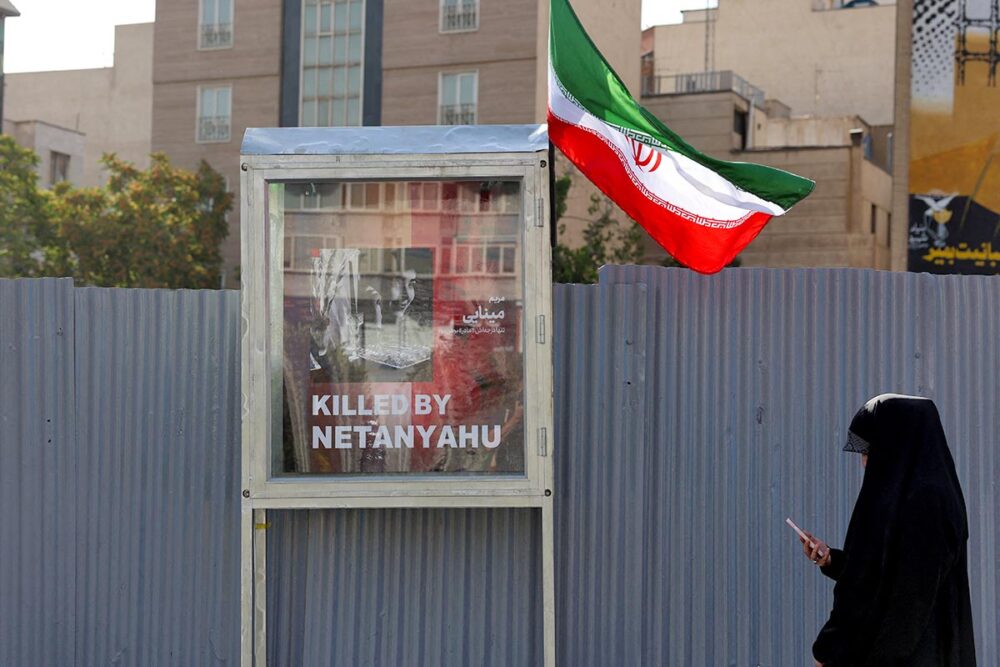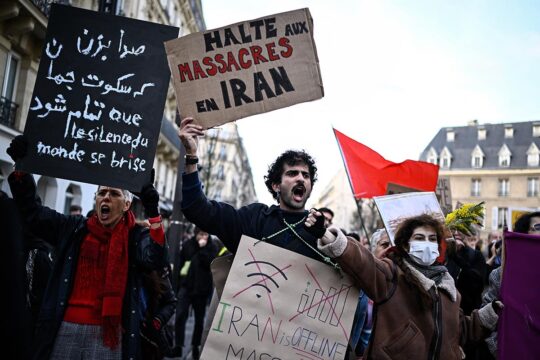Israel’s attack against Iran, launched on June 13 allegedly to target the country’s nuclear military programme, by destroying facilities and killing scientists, military leadership, and civilians, was both a dangerous military escalation and a brutal assault on the international legal order. The decision of the United States, under the direction of President Donald Trump, to launch direct military strikes against Iran, has taken the regional conflict into a confrontation between a superpower and a sovereign state.
US attempts to frame such overt act of aggression as a legitimate exercise of “collective self-defence” constitute a misrepresentation of international law. This intellectual distortion, however, is not a recent invention. It is a result of a legal playbook forged over the last decade in the crucible of the war against the group Islamic State of Iraq and Syria (ISIS). It also carries chilling echoes of the justifications deployed to wage the illegal invasion of Iraq in 2003, weakening the prohibition on the use of force, creating a permissive environment for the crime of aggression today. The same legal and political architecture has been redeployed today.
What the UN Charter says
The United Nations’ Charter of 1945 was designed to end unilateral warfare. It established a clear and broad prohibition on the threat or use of force against the territorial integrity or political independence of a state, with only one unambiguous exception: the “inherent right” of a state to use force in self-defence, in the strict and narrowly defined circumstance of “an armed attack”. Force that falls outside of this exception or by a direct authorisation by the U.N. Security Council violates the Charter and constitutes a crime of aggression.
Measured against this strict standard, the legal case for the Israeli strikes on Iran collapses, according to the International Commission of Jurists – which has described Israel’s use of armed force as “a grave violation of the United Nations Charter and international law and a major threat to international peace and security”. “A State’s actions only fall within the concept of self-defence (and are lawful) if the State is presently being attacked or if an attack upon it is imminent,” argued on her Linkedin page the London-based international barrister Sheryn Omeri KC, who has previously worked in the Office of the Prosecutor of the International Criminal Court (ICC). “Iran does not possess nuclear weapons and accordingly does not have the capability to deploy them against Israel, let alone a plan to do so imminently”, she added. In a correspondence with Justice Info, she critiqued the G7 leaders’ statement on the attack affirming that “Israel has a right to defend itself”. “The only State that does have a legal right to defend itself in present circumstances is Iran… Whatever the G7 may think of Iran’s politics, it is a sovereign State whose sovereignty is and must be protected by international law if the international rules-based order is to retain any credibility, or rather, if the G7 countries wish to be seen to be upholding that order,” Omeri said.
This legal assessment is shared by other experts who have decried the hypocrisy of Western powers. While Israel’s ambassador to the UN defended Israel’s actions before the UN Security Council as a “preventative strike” carried out with “precision” aimed at dismantling Iran’s nuclear programme, Omeri is clear: “‘Pre-emptive strikes’ do not exist in international law. Their very name suggests unlawfulness.” She referred to Israel’s Prime Minister Benjamin Netanyahu’s rhetoric that, “for decades the tyrants of Tehran have called for Israel’s destruction,” and she retorted: “If that has been the case ‘for decades’ – and it has not been acted upon by Iran – that cannot be the basis for any assertion that Iran destroying Israel is ‘imminent.’” This justification, based on a potential future capability rather than a present threat, is reminiscent of the flawed intelligence and pretext for the 2003 US invasion of Iraq; a “dusting off” of the fabricated weapons of mass destruction justifications, two decades ago.
The use and abuse of “existential” nuclear threats
Thelegality of the strikes on Iran is further challenged by the way they were – and are, still – conducted. “A State’s response which may amount to self-defence at its outset will fall foul of the principle of self-defence where it becomes disproportionate to the initial threat sought to be defended,” Omeri told Justice Info. The killing of Iranian nuclear scientists, an intentional targeting of civilians, is prohibited under international humanitarian law. The attacks on nuclear facilities like Natanz carry the catastrophic risk of radioactive release, a danger that has led the International Atomic Energy Agency (IAEA) to affirm that such attacks “constitutes a violation of the UN Charter”, and led millions of people in Iran – and across the border, in Iraq – to fear the potential effects of any radiation leaks. The principle of proportionality means that a state’s response must be limited to what is necessary to repel an attack.
The intellectual origins of the ‘existential threat’ advanced by Israel and used to circumvent this high bar, can be traced to a narrow and specific ambiguity in international law, famously articulated by the International Court of Justice (ICJ) in a 1996 Advisory Opinion on the Legality of the Threat or Use of Nuclear Weapons. In that case, the Court found that while the threat or use of nuclear weapons would “generally be contrary” to the rules of international law, it could not definitively conclude whether it would be lawful or unlawful in one very specific scenario: “An extreme circumstance of self-defence, in which the very survival of a State would be at stake.” This narrow carve-out has since been politically co-opted and broadened over time to justify other, conventional uses of force against any state that can be framed as an existential threat – providing disingenuous legal cover for acts of aggression, for example when the US introduced a pre-emptive doctrine in its national security strategy of 2002.
The framing of the Iran conflict reveals the hypocrisy that is at the heart of the international non-proliferation system. Dr Nada Ali, an international legal expert at the School of Oriental and African Studies (SOAS) of London University, points to how while Israel “is conducting itself like a rogue regime unconstrained by any legal or moral norms,” the West insists that “neighbouring countries remain non-nuclear”. This creates a security paradox. For a state like Iran, facing a nuclear-armed adversary like Israel which is actively engaging in military strikes, pursuing its own nuclear program becomes a “logical defensive strategy” rooted in the principle of deterrence. Ali contends that adhering to the non-proliferation treaty in such a context, where the system has failed to constrain other aggressive, nuclear-armed states like Israel, amounts to an abdication of the autonomy to protect oneself and its people. The entire non-proliferation system is premised on cooperation and the – broken – promise of gradual disarmament by existing nuclear powers. This imbalance, Ali suggests, ensures that any Western definition of “regional peace and security amounts to the security of Israel alone”.
Syria’s testing ground
The theory in favour of intervention may represent a profound distortion of the Charter, but its intellectual origins, and arguably the confidence with which it is now deployed against Iran, could be traced straight back to the Western intervention in Syria.
The war against ISIS provided a testing ground for this new legal architecture. Since 2014, the US-led Global Coalition has carried out thousands of airstrikes in Syria without the consent of the Syrian government and without explicit UN Security Council authorisation. To legitimise this breach of sovereignty, coalition members relied on the nebulous “unwilling or unable” doctrine, justifying strikes in Syria under the “collective self-defence” of Iraq and the global fight against terrorism. This approach created a “two-tiered system” of international law: one of restraint for the Global North, and another of aggressive, exception-based enforcement for the Global South. Despite evidence of indiscriminate Global Coalition bombardments against thousands of civilians in Raqqa, for example, no state has accepted responsibility.
Recent Israeli airstrikes targeting military infrastructure in Damascus, Hama and Homs, conducted without the consent of Syria’s internationally recognised government, similarly breach principles of sovereignty and non-intervention. There too, such strikes are illegal under international law, undermine international legitimacy, fuel resentment, and weaken the global legal order. Israel’s deadly attack on Iran’s consulate in Damascus in April, too, broke it. The legal arguments defending ongoing attacks on Iran and the violent, unending destruction of Gaza and its people are a chilling testament of an international order where the supreme crime of aggression is not only being committed, but is being licensed by the very powers who claim to uphold the law, once convincingly.
A decade-long attack on international law
Following the US strikes on Iran, leaders in Chile and Venezuela – itself a state that openly threatens of annexation its neighbour of Guyana – condemned the attack as illegal under international law. But the practical avenues for holding powerful state leaders accountable for the crime of aggression remain largely theoretical, particularly when their actions align with the geopolitical interests of the UN Security Council’s most powerful members. This is not exclusive to one geopolitical bloc.
Russia, in its own acts of aggression, has similarly abused the principles of international law. In 2014, the same year Coalition strikes in Syria were launched, Russia was executing its own illegal intervention in Ukraine, annexing Crimea and marking the beginning of the armed conflict between Russia-backed separatist forces and the Ukrainian military, which continued for eight years before Russia launched its full-scale invasion of Ukraine in 2022. This escalation was justified with claims that included preventing a supposed genocide, and the invocation of pre-emptive self-defence against NATO’s expansion. While the specific justifications differ from the counter-terrorism narrative used in Syria, the underlying mechanism is the same: a powerful member of the UN Security Council unilaterally disregards the Charter’s prohibition on the use of force to pursue its geopolitical ambitions. The war in the Donbas region began in April 2014; US-led airstrikes against ISIS began in Iraq on 8th August 2014 and were then extended into Syria in September.
The international legal order therefore faces a crisis manufactured by its most powerful members. The consequences of the legal rules crafted in Syria and Iraq, justifying intervention through exceptional doctrines and institutionalising impunity, mean that the prohibition on the use of force is no longer a constraint on the powerful states, but rather is a rule to be bent to suit their political ends –that can be copied. The assault on Iran is not a complex legal question with two equal sides. It is a calculated act of aggression, illegal under international law, and licensed by a decade of impunity. In that sense, it is not a new crisis, but another devastating chapter of a story that began long ago.

Alannah Travers is a postgraduate at the School of Oriental and African Studies (SOAS), University of London, specialising in the intersection of International Humanitarian Law, Human Rights and Islamic Law. She was previously based in Iraq, working with the Coalition for Just Reparations (C4JR) on the implementation of Iraq’s 2021 Yazidi Survivors’ Law and the closure of UNITAD. As a journalist and researcher, she was awarded the Fetisov Journalism award in Excellence in Environmental Journalism for her reporting on gas flaring and is the Silver winner of the United Nations Correspondents Association 2023 Elizabeth Neuffer Memorial Prize.







